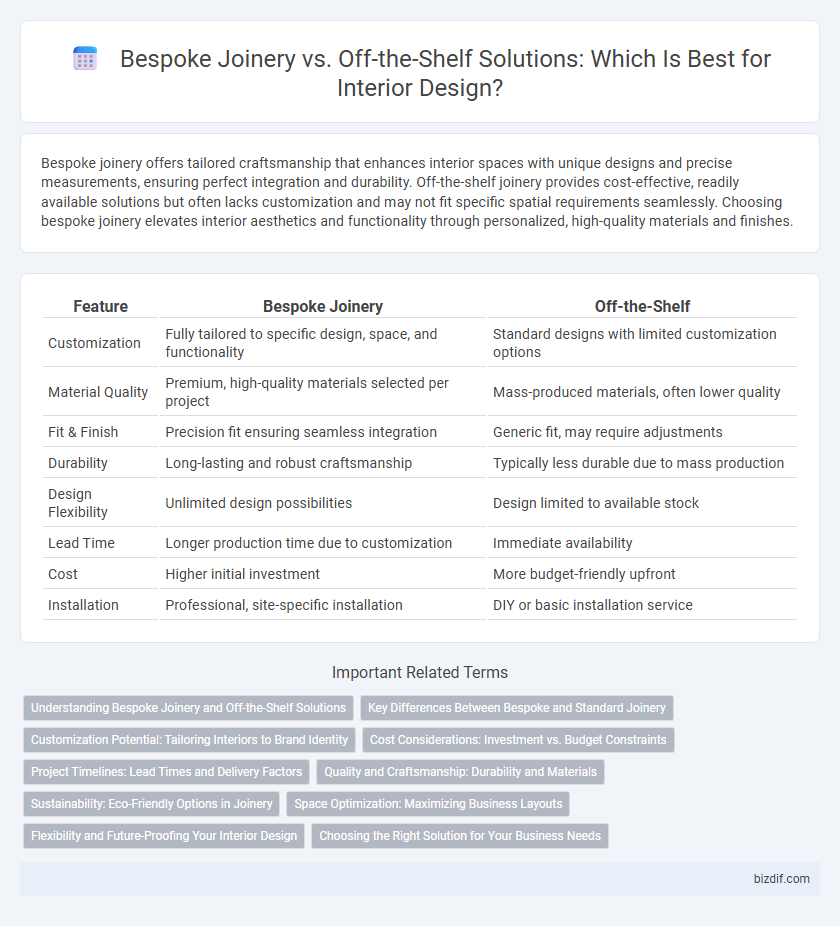Bespoke joinery offers tailored craftsmanship that enhances interior spaces with unique designs and precise measurements, ensuring perfect integration and durability. Off-the-shelf joinery provides cost-effective, readily available solutions but often lacks customization and may not fit specific spatial requirements seamlessly. Choosing bespoke joinery elevates interior aesthetics and functionality through personalized, high-quality materials and finishes.
Table of Comparison
| Feature | Bespoke Joinery | Off-the-Shelf |
|---|---|---|
| Customization | Fully tailored to specific design, space, and functionality | Standard designs with limited customization options |
| Material Quality | Premium, high-quality materials selected per project | Mass-produced materials, often lower quality |
| Fit & Finish | Precision fit ensuring seamless integration | Generic fit, may require adjustments |
| Durability | Long-lasting and robust craftsmanship | Typically less durable due to mass production |
| Design Flexibility | Unlimited design possibilities | Design limited to available stock |
| Lead Time | Longer production time due to customization | Immediate availability |
| Cost | Higher initial investment | More budget-friendly upfront |
| Installation | Professional, site-specific installation | DIY or basic installation service |
Understanding Bespoke Joinery and Off-the-Shelf Solutions
Bespoke joinery offers custom-crafted woodwork tailored precisely to a space's dimensions and style, delivering unique design elements that enhance interior aesthetics and functionality. Off-the-shelf solutions provide pre-manufactured, standard-sized furniture and fittings that are more affordable and readily available but often lack personalization and perfect fit. Understanding these differences helps homeowners and designers make informed decisions balancing budget, design goals, and installation requirements in interior projects.
Key Differences Between Bespoke and Standard Joinery
Bespoke joinery offers fully customized woodworking solutions tailored to specific dimensions, materials, and design preferences, ensuring unique and high-quality craftsmanship. Off-the-shelf joinery consists of pre-manufactured, standardized components that prioritize affordability and faster installation but may lack originality and precise fit. Key differences include the level of personalization, material selection, durability, and cost, with bespoke joinery typically delivering superior longevity and design flexibility.
Customization Potential: Tailoring Interiors to Brand Identity
Bespoke joinery offers unparalleled customization potential, allowing interior designers to create unique pieces that perfectly reflect a brand's identity and aesthetic vision. Unlike off-the-shelf options, custom joinery enables precise material selections, finishes, and dimensions tailored to specific spatial requirements and brand guidelines. This level of personalization enhances cohesion and exclusivity in interior spaces, reinforcing brand recognition and client satisfaction.
Cost Considerations: Investment vs. Budget Constraints
Bespoke joinery typically involves higher upfront costs due to custom design, skilled craftsmanship, and premium materials, representing a long-term investment in quality and uniqueness. Off-the-shelf solutions offer budget-friendly options with faster availability but may lack personalized fit and durability. Evaluating cost considerations requires balancing immediate budget constraints against the potential value and longevity of tailored joinery in interior design projects.
Project Timelines: Lead Times and Delivery Factors
Bespoke joinery typically involves longer lead times due to custom design, material sourcing, and precise craftsmanship, often extending project timelines by several weeks compared to off-the-shelf options. Off-the-shelf joinery offers faster delivery and immediate availability, ideal for tight schedules but with limited customization. Project timelines should account for installation complexities and supplier reliability, as bespoke pieces may require on-site adjustments, while off-the-shelf components usually fit standard dimensions, expediting the process.
Quality and Craftsmanship: Durability and Materials
Bespoke joinery offers superior quality and craftsmanship through the use of premium materials and meticulous handcrafting, ensuring enhanced durability and a tailored fit for any interior space. Off-the-shelf joinery often utilizes mass-produced components and standard materials, which can compromise longevity and fail to meet bespoke specifications. The investment in bespoke joinery results in a unique, robust product that withstands wear and maintains aesthetic appeal over time.
Sustainability: Eco-Friendly Options in Joinery
Bespoke joinery offers sustainable advantages by using locally sourced, renewable materials and minimizing waste through precise craftsmanship. Off-the-shelf joinery often relies on mass-produced components, which can involve higher carbon footprints and less environmentally friendly materials like MDF or particleboard. Choosing eco-friendly finishes and responsibly harvested timber in bespoke designs further enhances sustainability in interior joinery.
Space Optimization: Maximizing Business Layouts
Bespoke joinery offers tailored solutions to maximize every inch of a business layout by fitting precisely into unique spaces, unlike off-the-shelf units that often lead to wasted areas due to standard dimensions. Custom cabinetry and shelving enhance spatial efficiency by utilizing awkward corners, underutilized walls, and irregular room shapes, thereby increasing storage capacity without sacrificing aesthetic appeal. This strategic use of bespoke joinery not only elevates functionality but also creates a cohesive design that aligns perfectly with a commercial interior's operational flow.
Flexibility and Future-Proofing Your Interior Design
Bespoke joinery offers unparalleled flexibility by allowing customization to specific dimensions, materials, and styles, ensuring seamless integration with existing interior elements and future design updates. Unlike off-the-shelf options, which are limited to standard sizes and generic aesthetics, bespoke pieces can be adapted to evolving functional needs and personal tastes, enhancing the longevity and relevance of interior spaces. Investing in tailored joinery supports future-proofing by accommodating potential modifications and technology integrations, ultimately preserving the design's value and usability over time.
Choosing the Right Solution for Your Business Needs
Bespoke joinery offers tailor-made solutions that perfectly align with unique spatial requirements and design aesthetics, ensuring a seamless integration into your interior environment; off-the-shelf options provide cost-effective, readily available alternatives suitable for standardized projects with tight deadlines. Evaluating project scope, budget constraints, and desired quality levels are essential steps in selecting between custom joinery and pre-manufactured components. Businesses prioritizing brand identity and client-specific needs often benefit from bespoke craftsmanship, while those focusing on efficiency and scalability might opt for off-the-shelf products.
Bespoke Joinery vs Off-the-Shelf Infographic

 bizdif.com
bizdif.com